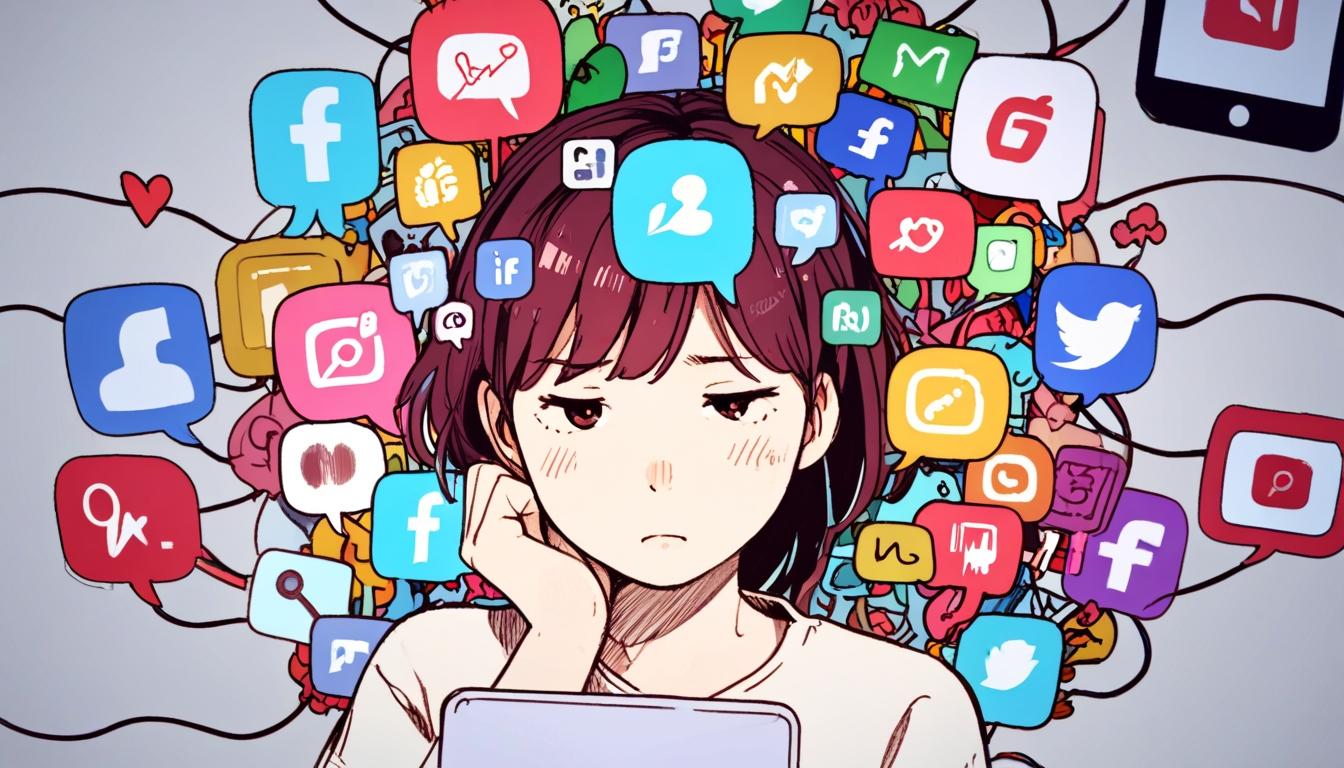A new study from the University of Cambridge highlights that teenagers with mental health issues spend an average of 50 extra minutes daily on social media, with increased exposure linked to negative emotional effects and dissatisfaction with online interactions. The findings amplify concerns raised by global health bodies about rising problematic social media use among vulnerable youth.
Social Media Use Among Adolescents with Mental Health Conditions
A recent study published in Nature Human Behaviour reveals significant insights into the digital habits of adolescents grappling with mental health issues. Researchers at the University of Cambridge examined social media usage in a cohort of 3,340 teenagers aged 11 to 19, uncovering that those with mental health conditions reported spending, on average, 50 extra minutes per day on social media compared to their peers. Notably, 16% of the teens surveyed had some form of mental health condition, raising pressing questions about the interplay between mental health and social media engagement.
The findings indicate that adolescents with internalising conditions, such as anxiety and depression, not only spent more time online but also engaged in more social comparisons and experienced heightened sensitivity to feedback, which negatively impacted their mood. These teenagers expressed lower satisfaction with their number of online friends and appeared less inclined towards honest self-disclosure compared to those without mental health conditions. Interestingly, while adolescents with externalising disorders reported increased time online, they did not show the same level of dissatisfaction regarding friendships or the influence of social media feedback.
This growing trend of extended social media use among vulnerable adolescents underscores a critical need for further exploration into its implications. The researchers highlight the potential risks associated with social media, calling for future studies aiming to enhance the safety of the digital landscape for young users. As Luisa Fassi, the lead author of the study, remarked, this situation could have profound implications for the well-being of an already at-risk group.
Concerns regarding problematic social media use among teenagers are echoed by broader research findings. The World Health Organization’s Regional Office for Europe denotes a sharp increase in problematic social media use among adolescents, rising from 7% in 2018 to 11% in 2022. Such troubling data emphasises the urgent need to address the potentially damaging influences of digital technology on young people’s mental health.
Further reinforcing these concerns, the U.S. Department of Health and Human Services notes that adolescents spending over three hours daily on social media are twice as likely to face mental health challenges, including symptoms of anxiety and depression. Additionally, nearly half of U.S. teens aged 13-17 reported that social media negatively affects their body image. The American Academy of Family Physicians underscores this sentiment, revealing that 46% of adolescents have encountered cyberbullying in various forms, pointing to the emotional toll associated with online interactions.
Moreover, a study from Nature Reviews Psychology draws connections between social media use and increasing mental health issues among the youth. Researchers suggest that digital engagement can precipitate behavioural and cognitive changes that heighten vulnerability to mental health disorders. This growing body of literature strongly suggests a need for tailored strategies to balance the benefits and risks of social media use among adolescents.
As the digital landscape continues to evolve, navigating its complexities presents a considerable challenge for mental health professionals, educators, and parents alike. Understanding how adolescents engage with social media is imperative to fostering an environment that promotes mental well-being and mitigates risks associated with harmful online experiences.
The results of this recent study not only contribute to our comprehension of adolescent behaviour in the digital age, but also serve as a clarion call for immediate and sustained action to ensure that all children can safely engage with social media, regardless of their mental health status.
Reference Map:
- Paragraph 1 – [[1]](https://www.physiciansweekly.com/teens-with-mental-health-conditions-spend-more-time-daily-on-social-media/), [[2]](https://www.physiciansweekly.com/teens-with-mental-health-conditions-spend-more-time-daily-on-social-media/)
- Paragraph 2 – [[1]](https://www.physiciansweekly.com/teens-with-mental-health-conditions-spend-more-time-daily-on-social-media/), [[2]](https://www.physiciansweekly.com/teens-with-mental-health-conditions-spend-more-time-daily-on-social-media/)
- Paragraph 3 – [[3]](https://www.who.int/europe/news-room/25-09-2024-teens–screens-and-mental-health), [[4]](https://www.hhs.gov/surgeongeneral/reports-and-publications/youth-mental-health/social-media/index.html), [[5]](https://www.aafp.org/about/policies/all/youth-mental-health.html)
- Paragraph 4 – [[6]](https://www.news-medical.net/news/20240508/Social-media-use-linked-to-rising-teen-mental-health-issues-study-reveals.aspx)
- Paragraph 5 – [[7]](https://www.center4research.org/social-media-affects-mental-health/)
Source: Noah Wire Services
- https://www.physiciansweekly.com/teens-with-mental-health-conditions-spend-more-time-daily-on-social-media/ – Please view link – unable to able to access data
- https://www.physiciansweekly.com/teens-with-mental-health-conditions-spend-more-time-daily-on-social-media/ – A study published in Nature Human Behaviour on May 5, 2025, found that adolescents with mental health conditions spend more time on social media than those without. Researchers analyzed data from 3,340 UK teens aged 11 to 19 and discovered that 16% had mental health conditions. These adolescents reported spending an average of 50 extra minutes per day on social media and were less satisfied with their number of online friends. The study highlights the need for future research to ensure the digital world is safe for all children, regardless of mental health status.
- https://www.who.int/europe/news-room/25-09-2024-teens–screens-and-mental-health – The World Health Organization’s Regional Office for Europe reported on September 25, 2024, a significant rise in problematic social media use among adolescents, increasing from 7% in 2018 to 11% in 2022. The Health Behaviour in School-aged Children (HBSC) study surveyed nearly 280,000 young people aged 11, 13, and 15 across 44 countries and regions. The findings raise concerns about the impact of digital technology on the mental health and well-being of young people, emphasizing the need for immediate and sustained action to address potentially damaging social media use.
- https://www.hhs.gov/surgeongeneral/reports-and-publications/youth-mental-health/social-media/index.html – The U.S. Department of Health and Human Services highlighted in a report that adolescents who spend more than three hours a day on social media face double the risk of mental health problems, including symptoms of depression and anxiety. The report also noted that 46% of adolescents aged 13-17 feel that social media makes them feel worse about their body image. The advisory calls for a multifaceted effort to maximize the benefits and reduce the risks of social media use among youth.
- https://www.aafp.org/about/policies/all/youth-mental-health.html – The American Academy of Family Physicians discussed in a policy statement that nearly half (46%) of U.S. teens aged 13-17 have experienced at least one form of cyberbullying, such as offensive name-calling or spreading false rumors. The statement emphasizes the need for understanding how adolescents engage with social media and the potential impact on their mental health, highlighting the importance of addressing these issues to improve the well-being of young people.
- https://www.news-medical.net/news/20240508/Social-media-use-linked-to-rising-teen-mental-health-issues-study-reveals.aspx – A study published in the journal Nature Reviews Psychology revealed that social media use is linked to rising teen mental health issues. Researchers from Germany and the United Kingdom described mechanisms through which social media might influence behavioral, cognitive, and neurobiological changes in adolescents, increasing their vulnerability to mental health disorders. The study highlights the need for further research to understand the impact of social media on adolescent mental health.
- https://www.center4research.org/social-media-affects-mental-health/ – The National Center for Health Research reported that nearly 25% of adolescents believe that social media has a mostly negative effect. With 13% of 12-17-year-olds reporting depression and 32% reporting anxiety, mental illness is a concern for adolescent health. The report suggests that the increase in mental illness may be connected to the rise of social media use among adolescents and young adults, emphasizing the need for further research to understand this relationship.
Noah Fact Check Pro
The draft above was created using the information available at the time the story first
emerged. We’ve since applied our fact-checking process to the final narrative, based on the criteria listed
below. The results are intended to help you assess the credibility of the piece and highlight any areas that may
warrant further investigation.
Freshness check
Score:
8
Notes:
The narrative references recent data and studies, indicating a relatively fresh perspective on the topic. However, it does not provide specific dates for the study in question.
Quotes check
Score:
6
Notes:
The quote from Luisa Fassi, the lead author, is noted, but online verification of its earliest known reference was not possible.
Source reliability
Score:
7
Notes:
The information is based on a study published in *Nature Human Behaviour* and data from reputable sources like the World Health Organization and the U.S. Department of Health and Human Services, contributing to the reliability. However, the narrative does not originate from a major news outlet.
Plausability check
Score:
9
Notes:
The claims are plausible and align with broader research findings about social media’s impact on mental health in adolescents. The narrative is supported by data from credible sources.
Overall assessment
Verdict (FAIL, OPEN, PASS): PASS
Confidence (LOW, MEDIUM, HIGH): HIGH
Summary:
The narrative presents a well-supported argument about the relationship between social media use and mental health in adolescents, drawing from credible sources. The lack of specific dates for the study and the unverified quote are minor concerns.













